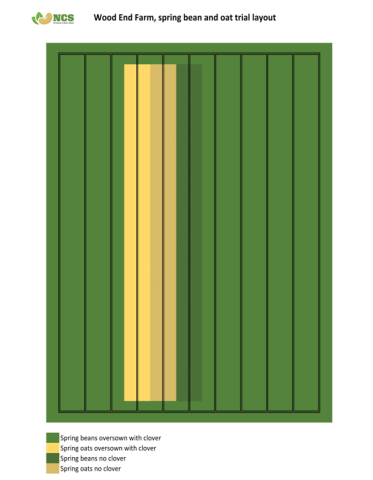Detailed Steps of the Trial:
- Sowing Details:
- Sowing Date: Friday, 17th May
- Crops Involved:
- Spring Beans: Victus 4.5ha
- Spring Oats: Conway 1.0ha
- Winter Beans: Vespa 5.8ha
- Clover Seed Blend: Sown at 4.7kg/ha, consisting of four varieties:
- 50% Aberlasting
- 20% Aberace
- 15% Aberpearl
- 15% Rivendel
- Sow Using Skippy Scout Drone:
-
- The drone broadcasts the clover seed into the standing crop, ensuring even distribution and efficient sowing.
-
- Monitoring and Assessment:
- Nitrogen Sequestration: Testing tissue and soil samples to measure nitrogen levels before and after the establishment of the clover understorey.
- Yield and Quality: Assessing the yield and quality of the subsequent winter wheat crops to determine the benefits of the clover understorey.
- Post-Harvest Management:
- Direct Drilling: After harvesting the beans and oats, winter wheat will be direct drilled into the established clover understorey, promoting soil health and reducing the need for synthetic nitrogen fertilisers.
Outcomes and Next Steps:
The trial aims to demonstrate the benefits of integrating white clover into crop rotations, enhancing soil fertility and crop performance. We will continuously monitor the progress and adapt our practices based on data and research findings. This approach aligns with our commitment to sustainable agriculture, aiming to reduce chemical inputs while boosting crop yields and quality.
By fostering a clover understorey, we hope to achieve:
- Improved nitrogen sequestration
- Enhanced yields and quality in winter wheat
- Greater biodiversity and soil health
This trial serves as a practical example of how innovative agricultural practices can lead to both ecological and economic benefits.




